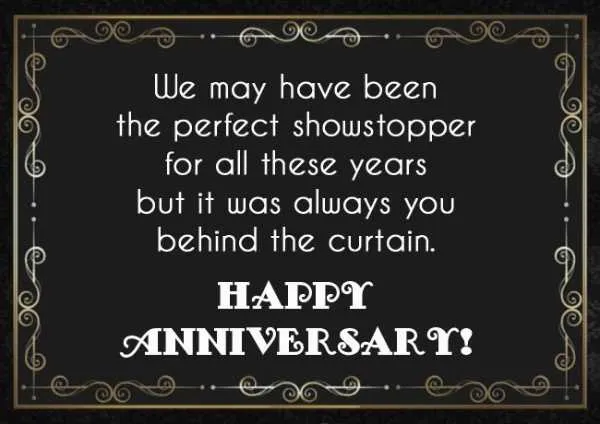Celebrating a Milestone with Heartfelt Anniversary Messages for the Boss

Marking a milestone in any company’s history requires a message that reflects both appreciation and recognition. Craft a message that genuinely acknowledges the efforts of everyone who contributed to making the anniversary possible. Focus on the dedication and hard work of the team that made significant achievements a reality. Personalize the message to emphasize milestones, highlighting those who played key roles in the company’s growth. Recognizing individual contributions fosters an environment of trust and motivation, reinforcing a sense of accomplishment.
When writing an anniversary message for your boss, keep it specific. Mention specific projects or moments that stood out, along with the values that guided the company’s progress. Use language that conveys your respect and admiration, but make sure to keep it genuine and relatable. Your message should speak to the future as well, reflecting the potential for growth while honoring past achievements.
Incorporate a tone that aligns with the company culture–whether formal or more relaxed–ensuring it resonates with the recipient. A personal touch, such as acknowledging a mentor or advisor role your boss played, adds authenticity. This ensures the message feels more than just a formality, but a true reflection of gratitude and forward-thinking leadership.
Boss Anniversary Message Guide
Craft a message that feels personal and specific. Reflect on the time your boss has spent with the company and the impact they’ve had. Acknowledge their leadership and the milestones achieved during their tenure.
Keep it concise: Avoid long-winded statements. Focus on the key achievements, both for the company and as a leader. Highlight one or two significant contributions that resonate the most.
Show appreciation: Express gratitude for their guidance and commitment. Acknowledge how their leadership has made a positive difference in your work environment or your professional growth.
Be sincere: Authenticity matters. Ensure your words reflect your true feelings, whether you choose a formal or friendly tone. Avoid generic phrases that can sound impersonal.
Balance professionalism and warmth: Stay respectful but don’t shy away from adding a personal touch. A message that is too stiff might feel disconnected, while an overly casual tone may seem inappropriate.
End on a positive note: Wish them continued success and express hope for more achievements together in the future. A closing that highlights the team’s excitement about the next year is a good way to finish.
Crafting a Personal and Memorable Message
Focus on making your message unique by highlighting specific qualities of your boss that you genuinely appreciate. Tailor the content to reflect their leadership style, values, or contributions to the team. This approach will show authenticity and thoughtfulness.
- Be Specific: Mention concrete examples of how their guidance has positively impacted the team or your personal growth. Instead of generic praise, focus on tangible outcomes or memorable moments.
- Use Their Language: If you know their preferred communication style, match it. For example, if they are known for being direct, keep your message straightforward and clear. If they are more laid-back, feel free to use a warmer, more personal tone.
- Acknowledge Their Impact: Recognize the ways in which their leadership has shaped your work environment, whether it’s through fostering innovation, supporting teamwork, or helping others grow in their careers.
- Express Gratitude: Show your appreciation in a way that feels genuine. Let them know how their support has made a difference in both your professional and personal life.
- Keep It Positive: Avoid focusing on challenges or setbacks. Instead, highlight what has been achieved under their leadership and the positive atmosphere they create within the team.
By focusing on these points, you ensure your message feels personal, sincere, and memorable. It will not only stand out but also strengthen your relationship with your boss.
Choosing the Right Tone and Language
Match your tone to the relationship you share with your boss. For a close, friendly rapport, a conversational and warm approach works best. However, if the connection is more formal, opt for a respectful and professional tone, avoiding overly casual language.
Keep it concise and to the point. Avoid unnecessary details that may dilute the core message. Focus on expressing appreciation, highlighting their leadership and contributions with clear, specific examples that reflect your admiration.
Be sincere. Authenticity is key to making the message feel meaningful. Avoid using exaggerated or overly polished phrases. A personal touch, such as recalling a memorable moment or achievement, can make the message stand out.
Finally, consider the timing. Ensure the tone matches the occasion. For a milestone anniversary, a more celebratory and upbeat tone may be appropriate, whereas for a professional achievement, a tone that balances respect and admiration works best.
Incorporating Company Culture into the Message
Reflect the company’s values in the anniversary message. Highlight key principles that the company stands for, such as teamwork, innovation, or customer care. For example, if collaboration is central, acknowledge the collective effort behind the company’s success.
Use the tone and language that employees connect with. If your company values openness, make the message personal and direct, showing appreciation for everyone’s contribution. Acknowledge achievements that align with your culture–whether it’s problem-solving or creativity in overcoming challenges.
Include specific examples of how the team has embodied company culture over the years. Mention milestones that reflect your values, like successful team projects, community involvement, or innovative product launches. This creates a more authentic and meaningful connection to the culture.
Personalize the message to resonate with different departments or teams. For instance, if your company celebrates creativity, mention how departments like marketing or product design consistently push boundaries and make a difference. Tailoring the message to specific teams boosts morale and makes the message feel more inclusive.